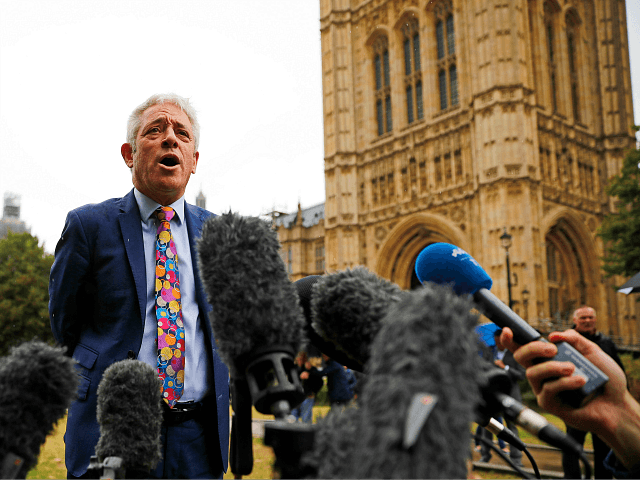John Bercow is reportedly set to be the first former speaker of the House of Commons to be denied a peerage in 230 years.
Despite Bercow formerly being a Conservative MP, previous Labour Party leader Jeremy Corbyn had nominated the Remainer for the honour. The move came after Prime Minister Boris Johnson — his party colleague and the last premier under which he served — broke with tradition by refusing to recommend him.
Corbyn endorsed Bercow in January following the dissolution of Parliament in November 2019. The House of Lords Appointments Commission (Holac) has been working on the Dissolution Honours List for months and is reported to be releasing it this week. Sources speaking to the Daily Mail have claimed on Monday that Mr Bercow is one of three Corbyn nominees set to be rejected, along with the socialist’s former chief of staff Karie Murphy and former deputy Labour leader Tom Watson.
Holac’s role is to vet nominees to the upper house to ensure “the highest standards of propriety”, and if rejected, it may be as a result of uninvestigated bullying claims against the former speaker.
“He has faced a raft of allegations about bullying members of his staff — all of which he loudly denies — while also earning Boris Johnson’s wrath after his outrageous tinkering with Commons procedures in a failed attempt to block Brexit,” the Daily Mail’s Andrew Pierce wrote on Sunday.
The report comes after a January claim in the media that Johnson had blocked Bercow’s elevation on the recommendation of Holac, which reportedly said it could not follow through on the nomination until a Parliamentary Standards investigation into the former speaker’s conduct cleared him.
The latter years of Bercow’s tenure had been plagued by the revelation of accusations of bullying by the then-speaker, claims that the former Conservative MP denies. Two former high-ranking officials in the House of Commons, however, allege that the claims were true but would never be properly investigated.
Former Black Rod David Leakey, who was in charge of maintaining order in the house and its precincts, had said in October 2019 that Bercow had created a climate of “fear and intimidation” in the Commons. Both Mr Leakey and Bercow’s former private secretary Angus Sinclair had cast doubt on the investigation, as Bercow was already on his way out of the Commons and no longer under its jurisdiction.
Mr Leakey had suggested the only way to publicly sanction the former speaker for the alleged bullying would be to withhold the honour of a seat in the House of Lords. He said he had “set an appalling example to the country, not least in publicly demeaning MPs in the Chamber and on TV”.
Bercow had also come under fire for his anti-Brexit stance. After leaving his post, he admitted that he had a “handmaiden role” in helping to stop a no-deal Brexit. He had also called Brexit “the biggest foreign policy mistake in the post-war period”.
Speakers are bound by impartiality rules, and while he had waited until after he left his role to vocalise his opinions on the UK leaving the EU, his actions in the Commons had been interpreted at the time as anti-Brexit and an intentional frustration of fulfilling the will of the people.
Bercow’s former deputy, Labour’s Natascha Engel, had accused the former speaker of accumulating so much power that during the hung parliament in 2019, he had “took upon himself the power to legislate” and allowed opposition backbencher Hilary Benn “to bring forward a bill that would stop a no-deal Brexit”. In so doing, Engel said Bercow had “transferred the powers of government to parliament” with Bercow at the helm of that power, which, she wrote, “In another country, we might have called it a coup.”

COMMENTS
Please let us know if you're having issues with commenting.